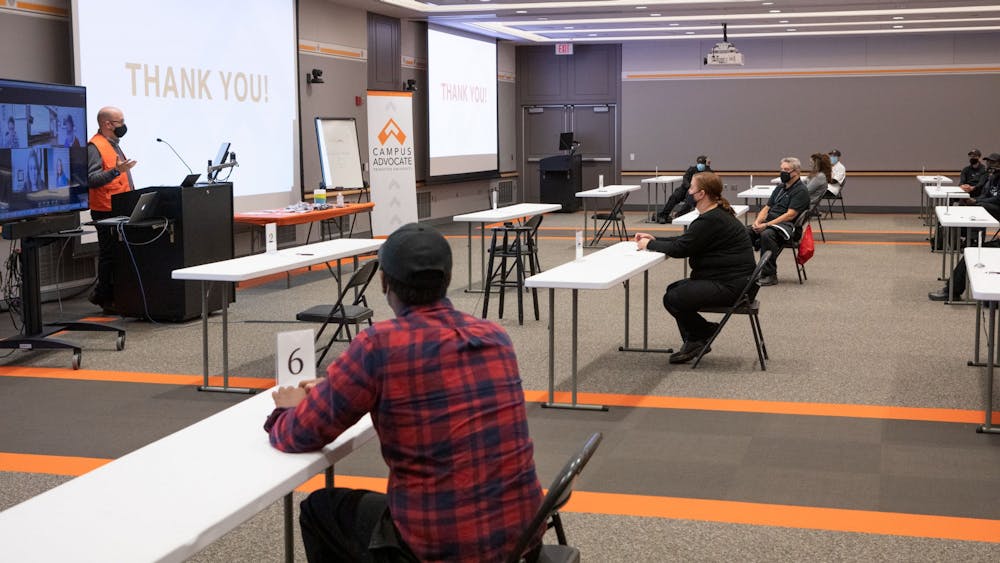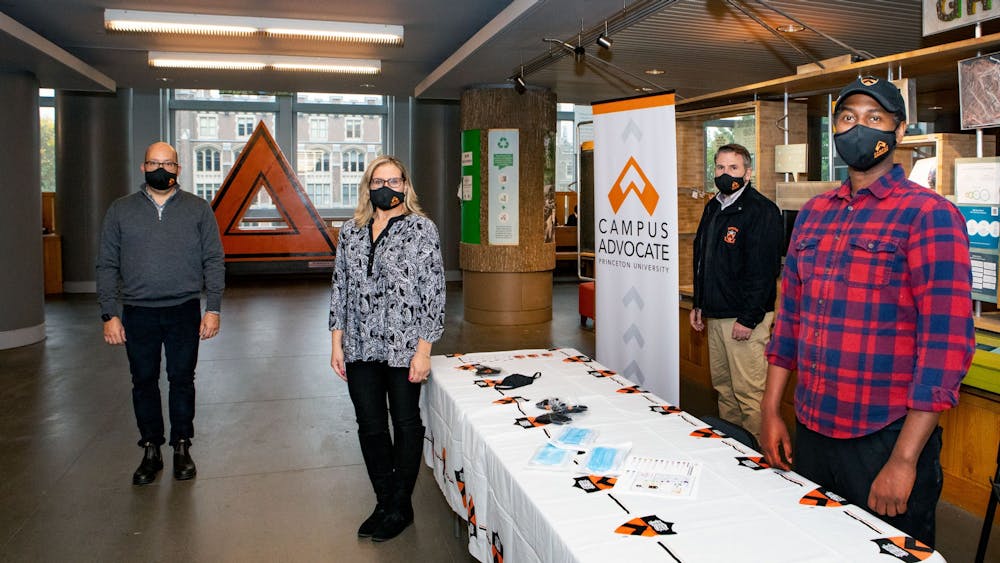Employees from various University departments took on new roles starting Monday, Oct. 19 as part of the University Services’ Campus Advocate Program.
Under the new program, about 100 employees from Campus Dining, Building Services, and Performing Arts Services will now “educate faculty, staff and students about the University’s health and safety guidelines,” according to a recent announcement from the Office of Communications.
“The goal of the Campus Advocate Program is to engage with our campus community, remind them of public health guidelines, and support them in being on campus safely,” wrote Debby Foster ’92, Assistant Vice President for Campus Services, in an email statement to The Daily Princetonian.
As of yesterday, Campus Advocates have set up information tables inside buildings such as Frist Campus Center, Firestone Library, the University Chapel, Jadwin Gymnasium, and other locations accessible to the few faculty, staff, and students currently allowed on campus.
They will distribute information on health and safety as well as supplies like hand sanitizer, disinfecting wipes, and face masks.
“I believe the presence of our Campus Advocates on campus will create a warmer, safer, more welcoming environment for our entire campus community,” Foster wrote.
Greg Michels, a catering hospitality manager, began his new role as a Campus Advocate on Monday.
“I think from time to time, everyone needs to be reminded of some of the simple guidelines,” he said. “You know: social distancing and wearing a mask.”

Michels clarified that the advocates would not have a disciplinary role. “We’re all in this together, and we just sometimes need to lend out a helping hand and a friendly reminder,” he added.

Employees attend a Campus Advocates training in the Frist Campus Center Multipurpose Rooms.
Denise Applewhite / Office of Communications
Seven months into the pandemic, Michels has worked a variety of jobs. This summer, he led a team of Campus Dining employees from the Graduate School for the Summer Food and Nutrition Program, packaging and labeling food for distribution to locals in need. From July to August, University workers helped “procure, prepare, and package” 9,500 meals a week for approximately 2,000 people around the community, according to the University’s announcement of the program.

The meals were made and distributed in partnership with Princeton Public Schools, HomeFront, the Rescue Mission of Trenton, and Meals on Wheels of Mercer County.
“At the end of the day, you felt like you completed your job for today, but you also felt like you had contributed a little bit more out there to the community at large,” Michels said.
Both the Summer Food and Nutrition Program and the Campus Advocate Program are part of the University's larger efforts in redeployment — essentially finding new roles for staff to keep them employed.
More than 100 Campus Dining staff have been redeployed in various jobs since the summer, according to Assistant Vice President of University Services Smitha Haneef. Of those 100, 69 are currently in the Campus Advocate Program.
“The program is an efficient redeployment opportunity for departments whose core work has been disrupted by the pandemic,” wrote Foster.
However, redeployment does not mean that employees are taking on completely different roles. Twyla Seward, the director of Building Services, sees the new Campus Advocate Program as a continuation of their previous work keeping the campus clean and safe.
Despite being a sizable undertaking, the program is only redeploying a small number of Princeton staff. The University estimates it employs about 7,000 benefits-eligible staff.
According to President Christopher L. Eisgruber ’83, University staff have kept their full time jobs during the pandemic.
“We have thus far avoided the layoffs that other institutions have had to do,” Eisgruber said in an Aug. 20 staff meeting, echoing his earlier statements in a May 4 letter to the Princeton Community.
Many Universities have announced mass layoffs and job cuts as a response to economic hardships caused by the pandemic. The Chronicle of Higher Education reported that about 19,200 fewer staff were employed by private colleges this March than in February.








